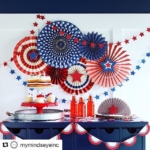News
April 17, 2017
National Retail Federation ups fight against ‘job-killing’ tax proposal
House Republicans in Congress have proposed a “border adjustment tax” on all imported goods — from clothing to computers, gasoline to groceries and toys to tires. The BAT would be a new, additional tax that would drive up the prices of countless products Americans use every day. This destructive new tax is a job-killing formula that would be bad for retailers and consumers alike.
NRF launched an intensive campaign against the BAT proposal earlier this year, and has now unveiled a second phase with new television commercials and digital ads that feature three small retailers explaining how the BAT would put them out of business. Shown in key congressional districts across the country, the ads ask viewers to go to stopthebat.tax to tell lawmakers to oppose the proposal.
The new ads build on NRF’s “As Seen on TV” campaign, which featured a satirical television commercial on programs like Saturday Night Live and Fox and Friends that went viral on the internet and drew widespread coverage in the news media. Also included were full-page print ads in Capitol Hill publications, a BAT.tax website and targeted digital and social media promotions that put the issue front and center.
Take action
NRF and more than 400 businesses and trade associations have formed the Americans for Affordable Products coalition to fight the BAT proposal. Retailers concerned about the impact on their businesses can sign up to become members of the coalition. The coalition also has established a newsfeed with the latest developments on the issue.
Small Retail Businesses: Take action and contact Congress to let them know about the devastating effects a border adjustment tax would have on the retail industry and consumer prices.
Retail Employees: Take action and contact Congress to let them know why a border adjustment tax would hurt retail and consumers.
Consumers: For American families, a BAT means increased prices on everyday goods like clothing, food, medicine and gasoline. Take action and contact Congress to let them know the BAT is a bad idea.
Invest in U.S. jobs
The NRF Retail Opportunity Index encourages Congress to invest in U.S. jobs by implementing tax policy that makes U.S. companies competitive in the global economy and provides a level playing field among all sectors of the economy and all sectors of retail. Learn more.
The issue
With President Trump and congressional Republicans both making it one of their top priorities and the same party now in control of both Capitol Hill and the White House, 2017 could be the year that Washington finally acts on long-delayed comprehensive tax reform. Consensus is building around broad outlines for pro-growth reform that would lower corporate rates, provide comparable relief for non-corporate businesses and benefit middle-class individuals as well. But there is significant debate over some provisions, including proposals that could drive up consumer prices by replacing the current income tax system with a consumption tax and creating a new border tax on imported merchandise.
House Republicans have become the first to offer a detailed proposal, although Trump has also released the outline of a plan and proposals are expected from the Senate.
The “Better Way” tax reform plan proposed by House Speaker Paul Ryan, R-Wis., and Ways and Means Committee Chairman Kevin Brady, R-Texas, would move the federal tax system toward a consumption tax. The plan would “broaden the base” by eliminating most tax deductions and credits, including deductions for imported goods and interest expenses. The revenue saved would be used to lower the corporate tax rate from the current 35 percent to 20 percent. Pass-through entities – which pay tax on business earnings as part of the owners’ personal taxes – would be taxed at 25 percent. The current range of seven personal tax rates from 10 percent to 39.6 percent would be compressed to three brackets of 12, 25 and 33 percent.
Under the plan, equipment and buildings (but not land) could be written off immediately rather than depreciated over several years. The last-in-first-out accounting method used by many retailers would be retained along with the research-and-development tax credit, the corporate alternative minimum tax would be eliminated, and income earned outside the United States could be “repatriated” tax-free.
As a consumption tax, the proposal includes a “border adjustment” provision that would refund to exporters the taxes they have paid on goods shipped overseas. But under border adjustment, retailers would no longer be able to deduct merchandise they import as a cost of goods. That means the full value of an imported item would be taxed, not just the retailer’s profit on the item, effectively creating a new 20 percent tax on imports. Doing so would give some retailers tax costs three to five times larger than previous profit margins and would dramatically drive up the price of imported merchandise – NRF expects price increases of at least 15 percent, costing the average family as much as $1,700 a year. Even retailers that do not import directly would see higher costs since wholesalers would likely pass along the increase. The vast majority of the imported items affected are not manufactured in the United States, so there would be no opportunity to substitute American-made inventory.
Economists who support border adjustment say currency exchange rates would adjust to compensate for the new tax on imports, but NRF has expressed concern that the change would not come fast enough and might not be large enough.
Speaking at Retail’s BIG Show in January, Federal Reserve Bank of New York President and CEO William Dudley said that he, too, is unsure that exchange rates would fully compensate for border adjustment and warned that the proposal would lead to “lots of unintended consequences.”
Wall Street analysts are also expressing concern. Goldman Sachs issued a report warning that apparel retailers “would be particularly vulnerable” while RBC Capital Markets said the plan “could have a severely adverse impact on most retailers.” In Washington, the Peterson Institute for International Economics held a conference that examined several aspects of the proposal, including whether it would be consistent with World Trade Organization rules and potential retaliation from other nations. Other economists and experts have called it “a terrible idea” that is “doomed to fail.”
NRF led 80 business groups in a letter to the House Ways and Means Committee that said “companies that rely on global supply chains would face huge business challenges” because of the higher taxes and higher costs of goods that would come under border adjustment, ultimately resulting in reduced employment and less capital investment. In addition, NRF and more than 400 companies and trade associations have formed the Americans for Affordable Products coalition to fight the border adjustment proposal.
In February, CEOs from some of the nation’s top retail companies met with President Trump at the White House Wednesday as NRF argued that comprehensive tax reform is needed but that the BAT would drive up prices for consumers and cost America jobs.
Separately from the House proposal, Trump has proposed reducing the corporate tax rate to 15 percent while maintaining the current income tax structure. Pass-through businesses would be taxed at individual rates of 12, 25 or 33 percent depending on the owners’ tax bracket. Repatriated earnings would be taxed at 10 percent, and manufacturers would be given the choice between immediate write-off of capital equipment investments or keeping the deductibility of interest. Trump has not included border adjustment in his plan, and has sent conflicting signals on whether he would support the House border adjustment proposal.
All of the current action comes after years of talk about comprehensive tax reform that has kept the issue in the headlines but stopped short of seeing passage of legislation in Congress.
While other countries have lowered corporate tax rates in recent years, the United States has stayed firm at 35 percent, leaving it with the highest corporate rate in the world and prompting some U.S. companies to move jobs overseas while deterring foreign companies from investing. The average corporate rate for most major industrialized nations is 25 percent, and some countries have dramatically lower rates. In addition, the U.S. tax system is riddled with special deductions and credits that can lower some companies’ tax bills but create incentives for executives to make decisions based on tax implications rather than what’s best for their businesses, stockholders and workers.
Why it matters to retailers
Retail benefits from few of the tax breaks that lower tax bills for other industries, and pays the highest effective corporate tax rate of any sector of the U.S. economy – at or close to the maximum 35 percent.
Because of that, the retail industry is a strong supporter of income tax reform that would broaden the tax base and lower the corporate tax rate. Based on previous economic studies performed by the congressional Joint Commission on Taxation and conducted for NRF by Ernst and Young, doing so would increase gross domestic product, wages and consumer spending.
Unfortunately, the House plan is expected to cause consumer spending to decline for at least five years and would raise prices for consumers. NRF believes tax reform can be accomplished without moving the burden to consumers.



















